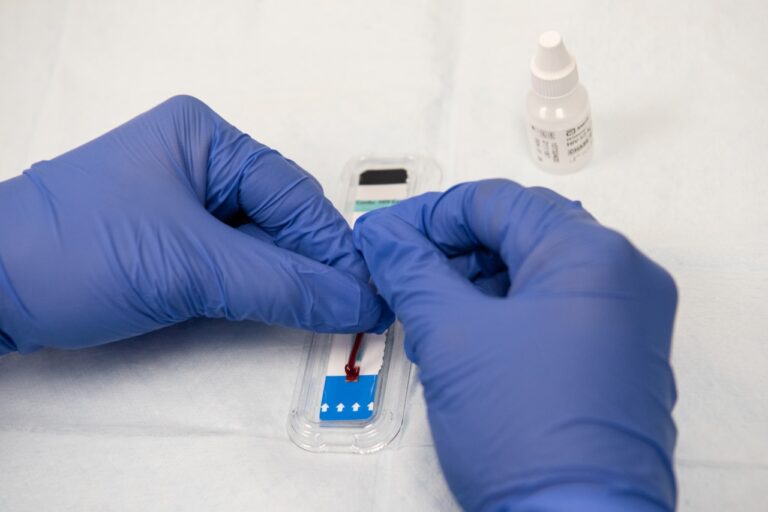Living with HIV in 2024 is very different from 40 years ago, when the virus first emerged.
Approximately 85% According to the Centers for Disease Control and Prevention, 70% of Americans on HIV treatment now have low viral loads and can’t transmit the disease, back when being diagnosed with HIV was akin to a death sentence.
But to reach undetectable status, people first need to know they have HIV, and across the country, some Latinos who recently arrived in the U.S. are getting tested for the first time and testing positive.
Hudson County is no exception to this trend, with a disproportionate number of HIV-positive cases among Latino gay men prompting the consolidation of support, testing, and treatment resources that specifically prioritize Spanish-speaking residents.
“We’re definitely seeing an increase in Latino men who have sex with men,” said Elvis Guiracocha, Hudson Pride’s community health program manager. “Spanish-speaking, undocumented, from different parts of the world. They’ve been living with HIV for years, maybe.”
Outreach efforts have accelerated Many Latinos New office opens in northern part of county We also implement programs to connect at-risk Latin American residents with neighborhood resources.
Last year, 60 Hudson County residents tested positive for HIV and qualified for low-income care programs, regardless of their legal status, said Chad Balodis, program manager for the Hudson County HIV/AIDS Planning Council.
Of the 60 cases, 54% are Latino; That’s a disproportionately high number considering about 40% of the county’s residents are Latino, he said.
Hudson County reported 156, 124 and 54 new cases in 2019, 2020 and 2021, respectively, the most recent state data available that may have been skewed by COVID-19 lockdowns.
Nationwide, Latino men had the highest rate of new HIV diagnoses among gay and bisexual men in 2022, according to a KFF Health News/Associated Press analysis of federal data.
Jersey City Medical Center has had success identifying HIV cases by adding HIV testing to emergency room blood draws for patients in certain age groups. “We’ve already seen 50 new diagnoses in the last three months,” Balodis said.
He said the trend is alarming but not unexpected: His planning committee is helping the county decide how to allocate federal funds earmarked for HIV programs, which are already targeting the needs of Latino communities.
One way is to funnel funds to North Hudson through a new West New York facility run by Hyacinth, a local nonprofit that specializes in HIV, which opened more than a year ago.
Balodis also said conducting the tests at nonprofits rather than government buildings would lower the barrier to entry for undocumented immigrants who fear interacting with the government.
“It was about building trust,” Balodis said.
North Hudson Communication Action Corporation (NHCAC) There were nine HIV diagnoses last year, and only halfway through this year, there have already been seven diagnoses. The majority of the cases in Hudson County live in West New York, Union City, North Bergen and Guttenberg.
“Most of the time, these patients are new to us,” said Iris Carbone, a high-risk navigator supervisor at NHCAC who helps inform patients of their diagnoses and connects them to treatment resources. “They say, ‘Oh, I came[to the U.S.]a year ago,’ or ‘I’ve been in the country for two years.'”
Hudson Pride launched a rapid testing program last year and discovered that many undocumented immigrants from Latin America had never been tested for HIV before. Guiracocha said.
Latino HIV Beginnings It launched a support group in January to provide resources to anyone who tests positive to begin treatment, and Hudson Pride ensures that each program has at least one Spanish-speaking staff member.
Guiracocha said encouraging people to get tested is the focus of Hudson Pride’s current advertising campaign, both for Jitnibus and the dating app.
Carbone and Guiracocha say newly diagnosed HIV patients are often frightened, and educating them about medical advances that can help the virus go undetectable is an important part of modern treatment.
But many undocumented patients who finally learn they have HIV have actually been infected for years, Guiracocha says. Informing them of their status is key to connecting them to treatment as soon as possible and shortening the time it takes for them to become undetectable.
He recalled that a person who had recently arrived from Venezuela visited Hudson Pride seeking help finding housing and took a rapid test during their visit. The person tested positive.
“Even though that wasn’t their original need when they came to our center, they left very grateful,” Guiracocha said.

